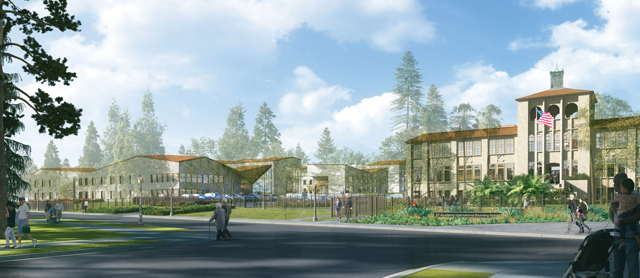
A new boarding school is coming to L.A. County, but unlike traditional boarding schools, this one will focus almost exclusively on international students. EF Education First, a Swiss education company with more than 52,000 employees in at least 114 countries, broke ground last month in Pasadena on its first Los Angeles-area campus, which will sit at the site of a former Catholic university it purchased last year.
When it opens in September after a $90 million renovation and expansion, the 15-acre EF Academy campus on Howard Street will be the first large-scale boarding school to open in the Los Angeles region in nearly 100 years.
EF Education First plans for the school to eventually host 975 high school-age students and 150 faculty and staff members.
L.A. County has less than 10 boarding schools, all with fewer than 500 students. Several are affiliated with religious institutions. The oldest is Webb Schools, founded in Claremont in 1922, which has boys’ and girls’ campuses with about 200 students each.
The EF Academy will differ from other schools with its focus on international languages and cultures. EF Education First executives expect close to 90% of students to come from other countries, especially China and other East Asian nations.
“For our international students, Los Angeles is a very desirable place to live and learn,” said Shawna Marino, vice president with EF Education First.
Marino said the Pasadena location was chosen because of its proximity to major colleges and universities, including Caltech and the ArtCenter College of Design.
“We’ll be collaborating with both those institutions,” she said. “We’ll also be seeking internship opportunities for our students with local companies.”
Major expansion
Lucerne, Switzerland-based EF Education First, which according to Forbes had $6 billion in revenue in 2017, purchased the former campus of William Carey International University in April 2018 for an undisclosed sum.
Almost all the money is coming from EF Education First itself, to convert and expand facilities, Marino said. That’s unlike facility and expansion projects at private schools, which often rely on philanthropic contributions.
EF Education First has hired San Francisco-based Gensler as the chief architect. San Diego-based Bycor General Construction is the general contractor; Bycor built facilities, at EF Education First’s San Diego campus.
Plans call for the 277,000-square-foot Pasadena site to expand to roughly 320,000 square feet. Of the original 11 buildings, four structures totaling 43,000 square feet have already been demolished, Marino said. Another six are set to be renovated.
One building is being completely replaced with a 130,000-square-foot student dormitory. There will also be a new interior recreation space, including a pool and a gym.
Marino said EF Education First also acquired 16 residential lots near the campus in adjacent Altadena; those properties will be turned into faculty and staff housing.
When the campus opens next September, it will host roughly 200 students in 9th and 10th grade, and about 45 faculty members, according to George Stewart, the new Head of School for the EF Academy. Most students and faculty will be from other countries.
International focus
“When you look at the students and faculty, it’s going to resemble a mini United Nations, representing people all over the world,” Stewart said.
Over the next five years, 11th and 12th grades will be added as the school expands to its full target of 975 students, he said. The faculty will increase to about 80.
Initially, tuition is expected to run about $40,000 a year for day students and between $55,000 and $60,000 a year for boarding students. Day-student tuition is equivalent to college preparatory schools such as Harvard-Westlake School, while boarding tuition is slightly less than the $66,000 charged by Webb Schools.
Stewart said there will be three curriculum tracks: an international baccalaureate diploma, a high school diploma similar to any other California high school and a hybrid of those programs.
“The classes will be generally similar to what you would find in most high schools — math, chemistry and science — with one important exception: an intense focus on international language, whether it’s English as a second language or instruction in other languages,” he said.
Another difference will be the instruction style. “With us,” Stewart explained, “it’s all about experiential or project-based learning — looking at real-world situations.”
Marino said there would be no corporate sponsorships or endowed faculty chairs. Rather, funding would come entirely from tuition and EF Education First corporate.
‘Vibrant’ niche
EF Education First is the largest of a relatively new model for boarding schools — at least in the United States, according to Robert Filback, professor of clinical education at USC’s Rossier School of Education.
“Though it’s come to the U.S. only recently, the international school model is a vibrant market all over the world, with some in Europe and a rapidly growing number in Asia,” Filback said.
“They are not going after the same market we here in the U.S. think of for boarding schools — the old East Coast institutions where generations of aristocracy have sent their children,” he added. “Instead, what we’re seeing is increased student mobility around the world. It started at the higher education level but in recent years has trickled down to the high school level.”
Filback said he believes the chief international market for the Pasadena EF Academy campus will be Asia, especially China. “If I was going after the Asian student market, Los Angeles is the absolutely crucial U.S. location,” Filback said. “L.A. is a regular stop for individuals coming from China and other parts of Asia.”
